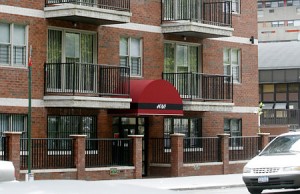Posted by Teresa on May 7, 2010 under Tenant Credit Checks, Tenant Screening & Background Checks | 
 The Fair Credit Reporting Act (FCRA) established rules to protect privacy and guarantee report accuracy when businesses, banks, and rental property owners check consumers’ credit histories. Landlords are allowed to obtain tenant credit reports as long as they follow the FCRA’s provisions.
The Fair Credit Reporting Act (FCRA) established rules to protect privacy and guarantee report accuracy when businesses, banks, and rental property owners check consumers’ credit histories. Landlords are allowed to obtain tenant credit reports as long as they follow the FCRA’s provisions.
Specifically, when landlords obtain information about a potential tenant’s credit history, rental history, previous evictions or a variety of other pertinent personal information, and they use that information to determine what they require from the tenant, they must give the tenant an “adverse action notice.”
For example, a low credit score might mean the landlord requires a co-signer on a lease application. Or, a previous eviction may mean the tenant’s application is denied altogether. Even requiring a higher rent deposit is considered an “adverse action,” if it is based on information obtained in a consumer credit report. And really, if a landlord requires a higher deposit from Tenant B than from Tenant C, the only grounds he or she could base that decision on would be a tenant credit report—or else a discrimination claim under the Fair Housing Act could be in that landlord’s future.
When a landlord takes adverse action against a tenant applicant, the FCRA requires a notice to be supplied to the tenant. The notice must include:
- the name, address and telephone number of the Consumer Reporting Agency (CRA) from which the report was obtained;
- a statement that the CRA did not make and cannot specify the reasons for the adverse decision;
- a notice of the tenant’s right to dispute the accuracy of the information the CRA supplied;
- notice of the tenant’s right to a free credit report upon request from the CRA within 60 days.
The adverse action notice can be given verbally; however, a written notice is advised, since the landlord would then have proof of giving the notice to the tenant.
Even if the CRA is checking information that has nothing to do with the tenant’s credit, such as verifying tenant employment or income—an adverse action notice is required if that information is the basis of a denied application, higher security deposit, or other action required by the landlord.
There are serious legal ramifications for landlords who fail to supply notices required by the FCRA. Check with your attorney if your procedures are called into question, but in the meantime, educate yourself about your responsibilities under the law.
The Fair Credit Reporting Act is available online, so it’s easy to familiarize yourself with its provisions and updated requirements. And updates are done frequently, so it’s up to every rental property owner to stay informed on a regular basis.
Posted by Teresa on December 8, 2009 under Screening and Background Checks, Tenant Credit Checks, Tenant Screening & Background Checks | 
 Tenant screening involves conducting background checks on potential tenants. Typical checks include tenant credit check, criminal background check, and tenant rental history. Landlords and rental property managers also have the option to check previous addresses, identity and name validation, address validation, evictions, liens, bankruptcies, and sex offender status.
Tenant screening involves conducting background checks on potential tenants. Typical checks include tenant credit check, criminal background check, and tenant rental history. Landlords and rental property managers also have the option to check previous addresses, identity and name validation, address validation, evictions, liens, bankruptcies, and sex offender status.
Here are some dos and don’ts to consider when making the decision to screen tenants:
- Do keep the screening process consistent: screen every applicant, every time.
- Don’t make yourself vulnerable to discrimination suits by screening applicants based on appearance or other subjective attributes.
- Don’t skip the tenant screening for an applicant who speaks well or dresses nicely, or the tenant applicant who drives a nice car—again, these are subjective observations that do not mean they will pay rent on time.
- Do protect your other tenants and the neighbors surrounding your rental property by including criminal history in your background check process.
- Do choose your screening service carefully. Are they a Better Business Bureau Accredited Business and Fair Credit Reporting Act (FCRA)-Compliant Consumer Reporting Agency? Is the staff FCRA Certified and Bonded?
- Do ensure that your screening service employs high security measures, such as fingerprint scanners, controlled access, monitored facilities, and proper disposal techniques.
- Don’t use a screening service without nationwide coverage and access to all three credit bureaus.
- Do keep all information learned from a tenant credit report in strictest confidence.
- Don’t neglect to provide a tenant applicant with a copy of the report, and to advise them in writing if you reject them for credit reasons.
Posted by Teresa on September 21, 2009 under Screening and Background Checks, Tenant Credit Checks, Tenant Screening & Background Checks | 
 It’s rather difficult to find anyone who has not been affected by the economic troubles of the past year. That includes people who want to be your tenants. What should you look for when running tenant credit checks these days? If everybody’s credit is bad, why bother to do a credit check? Should landlords and property managers lower their standards in light of the rise in rental vacancies? Read on for answers to these questions.
It’s rather difficult to find anyone who has not been affected by the economic troubles of the past year. That includes people who want to be your tenants. What should you look for when running tenant credit checks these days? If everybody’s credit is bad, why bother to do a credit check? Should landlords and property managers lower their standards in light of the rise in rental vacancies? Read on for answers to these questions.
Why bother with a tenant credit check when it’s going to be bad? Besides, if I skip it, I save money, right? Actually, the money you invest by doing thorough tenant screening will more than pay for itself when you consider the long term cost of evicting and/or cleaning up after bad tenants. And believe it or not, lots of folks are making it through the down economy by spending less, saving more, and keeping their credit records clean.
Should I lower my standards? This is a tough rental market, with rents down and vacancies up. You must decide whether to keep your qualifying standards high—and face empty units—or take a chance by lowering them in order to fill your properties. Experienced landlords say that empty units are far better than renting to bad tenants. It all depends on your tolerance risk, your cash flow—and a lot of luck.
Can I ask why a prospective tenant has had a bankruptcy? Yes. There is no time like the beginning to start communicating clearly with your tenants. If there is a bankruptcy on the credit check, ask what happened. You may find out that medical bills forced the tenant into bankruptcy, or that an ex spouse was actually the cause. Of course, if the tenant has other red flags on the credit report, you must take them into consideration, too.
Take a wide-angle view of the tenant’s credit history. If a bankruptcy is several years in the past, and everything else checks out, they may be an acceptable risk. If the bankruptcy was due to a business failure, the economy could be to blame—not the tenant. Past evictions and utility judgments are a higher risk indicators to many landlords than bankruptcies.
Do not ignore your gut instinct. If someone seems untrustworthy, they very well might be. Only you can decide whether a poor credit score or bankruptcy is worth the risk. The important thing is to perform consistent tenant credit checks!
Posted by Teresa on August 4, 2009 under Housing Trends, Tenant Credit Checks, Tenant Screening & Background Checks | 
 As the housing market struggles to recover from its historic downturn, thousands of new condominiums remain unsold across the country. Many cash-strapped developers are turning to leasing unsold units—which can cause problems among residents who purchased theirs.
As the housing market struggles to recover from its historic downturn, thousands of new condominiums remain unsold across the country. Many cash-strapped developers are turning to leasing unsold units—which can cause problems among residents who purchased theirs.
Condos are usually rented by their owners—not by the developers of a project. But when the majority of units have not sold, developers—and their lenders—get more creative. Renting is one way to fill units and improve cash flow. And in this economy, cash is king!
But is renting to unknown tenants okay with the owners in the building? Often, it depends on numbers. A few rented units, while a risk for the developer because they can no longer be sold as “new,” are usually not a problem with the owner-neighbors. But when a majority of units are rentals, it can hurt property values—and discourage potential buyers, too. Renting condo units can become a sure way to prevent selling units—an unending cycle.
However, even if condo owners don’t like buildings inhabited by renters, there is usually little they can do about it. Most developers will reserve the right to lease unsold units in the sales contract—and buyers have already agreed to it.
If you’re a developer with unsold condo inventory on your hands, you might consider renting units to quality, pre screened tenants. You can appease unit owners by assuring them the condos will be rented only to tenants who have passed background checks, including credit checks and criminal history screening. You’ll sleep better, too, when you properly screen tenant applicants!
Besides, condo owners might consider themselves lucky to not own a unit in a certain luxury building in New York City—where the owner is renting unsold units to a homeless shelter. Sometimes you do what you have to do—and at least the homeless are benefiting.
Posted by Teresa on March 7, 2009 under Landlord Tips, Tenant Credit Checks | 

Finding great tenants is a big job. So when you have them, you want them to stick around. If you’re renewing leases, it’s good sign that both parties are satisfied. Avoiding tenant turnover can yield significant cost savings—no major repairs or painting, cleanup, or advertising for new tenants. So, if you have a good track record with a current tenant, and you’re both happy, do what you can to renew the lease, and save yourself time, money, and trouble.
Communication is Important
There is no standard lease renewal process. Most leases are for a specified period of time; if there is no language regarding renewal, the lease expires on the date indicated, and your tenant is free to move out. In this situation, you’ll want to approach your tenant at least two months ahead to inquire about his or her plans. If you want your tenant to stay, make sure they know it! Of course, you have no obligation to renew a lease.
Renewal Language in a Lease
Even better: why not cover yourself and spell everything out in writing? Then, everyone knows what to expect. Your rental agreement or lease could include a “renew by” date, usually 30-60 days prior to expiration, by which your tenant must inform you if they are NOT renewing the lease. If they do not, it is assumed the lease will be extended. You can specify in the lease whether the renewal is for the same time period and under the same terms, or if it is month-to-month or some other length of time.
Be a Good Landlord
It doesn’t hurt to check in on your property regularly—and to check in with tenants when the lease is coming to its end. There may be a repair job needed, or a small upgrade you can provide to entice your tenants to stay. If you care about your tenants, make sure they know it!
Renew the Credit Check, Too
It’s a good idea to recheck a tenant’s credit when renewing the lease. Be sure you are in compliance with the Fair Credit Reporting Act if you do.
Posted by Teresa on March 5, 2009 under FCRA Issues, Tenant Credit Checks, Tenant Screening & Background Checks | 

Steering Clear of Problem Tenants
Managing rental property is no easy task. Why make it harder than it already is? After all, your properties are only as easy to manage as the tenants who live in them. Employing best practices consistently on each and every rental is the key to managing income property smoothly—and avoiding discrimination issues, too. One way to avoid trouble is to check potential tenants’ credit and criminal history.
Is it Legal to Check a Tenant’s Credit History?
Absolutely. Renting property brings monetary and legal risks to the property owner. You need to mitigate risk wherever you can, and checking credit history is a great way to do so. As part of the rental application, your prospective tenant can agree to a credit check with a signature. You’ll know for sure if the applicant is a good risk—or one to stay away from. Even a tenant with a great credit history can miss paying rent on time—but again, the idea is to lessen that risk by choosing the best possible tenant.
Remember that all information you learn from a credit report must be held in strictest confidence, and never shared with third parties. Your applicant may have a right to the report—check your state’s guidelines and the Fair Credit Reporting Act (FCRA) to be sure you are compliant. If you reject an applicant for credit reasons, you must advise them in writing. Consider having a reputable, professional tenant screening service handle your background screening to ensure you are within the guidelines of the FCRA.
What Will a Tenant Screening Credit Check Tell Me?
The credit check will reveal how promptly the applicant pays credit cards and loans, plus any outstanding judgments or bankruptcy filings. Look for a good record of responsible finances, and see if the applicant appears to be living beyond their means. Conservative spenders will be more likely to survive an emergency or job loss without major upheaval—like breaking your lease agreement.
The credit check will also reveal previous addresses—compare these with the application and investigate any inconsistencies. There could be a simple explanation—or the prospective tenant could be hiding something.
Is it Legal to Check a Tenant’s Credit History?
While you don’t have a legal duty or obligation to do so, you may certainly include criminal history in your tenant screening process. Keeping your property, other tenants, and yourself safe from potential damage is well worth it. These reports typically cover records at the county or national level; different reports are available in different states. Check with a professional tenant screening company for details.
The important thing to remember is to be consistent: screen all applicants in the same way, each time. Making an exception could be reinterpreted as discriminatory—and it could literally open your doors to potential problem tenants. A clear policy of running criminal background checks on all applicants is the best protection for you, your other tenants, and the community.
Next Post: Renewing Leases
 The Fair Credit Reporting Act (FCRA) established rules to protect privacy and guarantee report accuracy when businesses, banks, and rental property owners check consumers’ credit histories. Landlords are allowed to obtain tenant credit reports as long as they follow the FCRA’s provisions.
The Fair Credit Reporting Act (FCRA) established rules to protect privacy and guarantee report accuracy when businesses, banks, and rental property owners check consumers’ credit histories. Landlords are allowed to obtain tenant credit reports as long as they follow the FCRA’s provisions.




